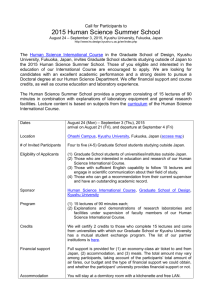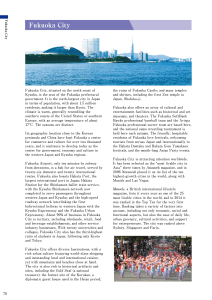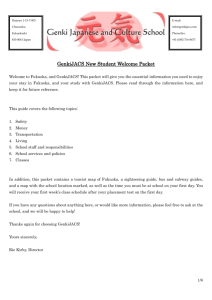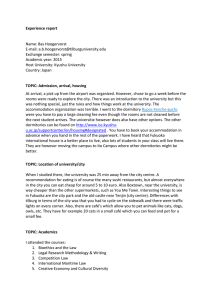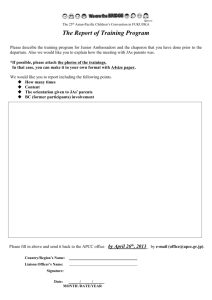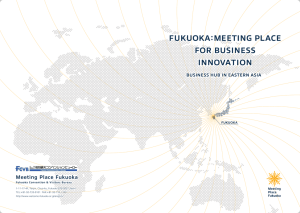Experience report
advertisement
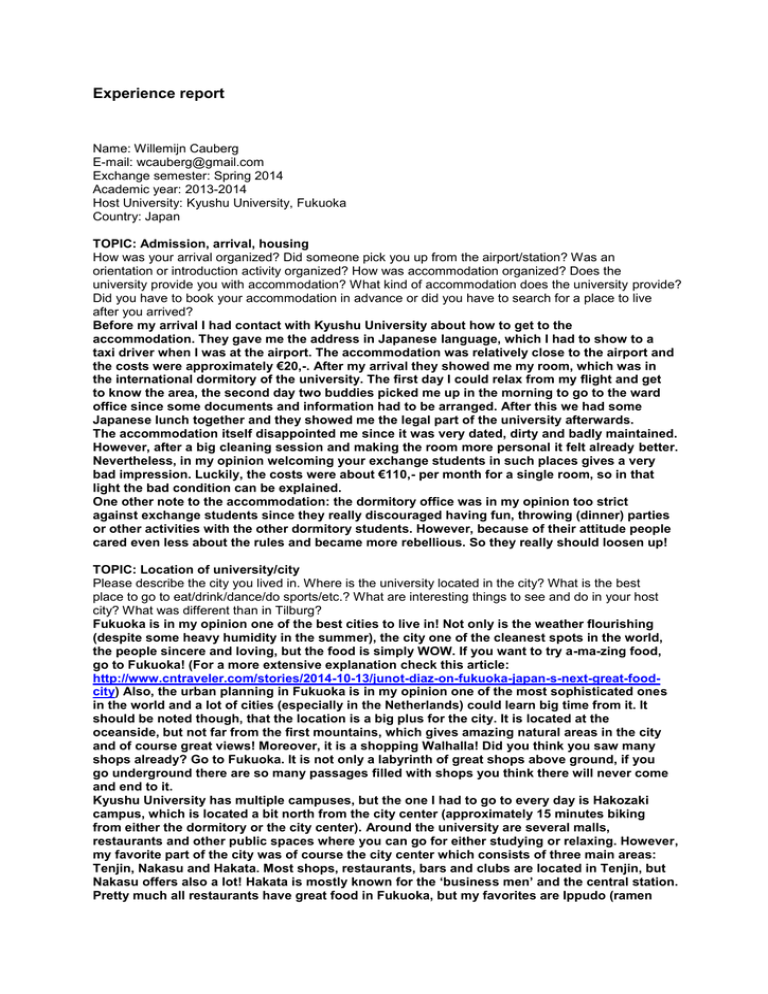
Experience report Name: Willemijn Cauberg E-mail: wcauberg@gmail.com Exchange semester: Spring 2014 Academic year: 2013-2014 Host University: Kyushu University, Fukuoka Country: Japan TOPIC: Admission, arrival, housing How was your arrival organized? Did someone pick you up from the airport/station? Was an orientation or introduction activity organized? How was accommodation organized? Does the university provide you with accommodation? What kind of accommodation does the university provide? Did you have to book your accommodation in advance or did you have to search for a place to live after you arrived? Before my arrival I had contact with Kyushu University about how to get to the accommodation. They gave me the address in Japanese language, which I had to show to a taxi driver when I was at the airport. The accommodation was relatively close to the airport and the costs were approximately €20,-. After my arrival they showed me my room, which was in the international dormitory of the university. The first day I could relax from my flight and get to know the area, the second day two buddies picked me up in the morning to go to the ward office since some documents and information had to be arranged. After this we had some Japanese lunch together and they showed me the legal part of the university afterwards. The accommodation itself disappointed me since it was very dated, dirty and badly maintained. However, after a big cleaning session and making the room more personal it felt already better. Nevertheless, in my opinion welcoming your exchange students in such places gives a very bad impression. Luckily, the costs were about €110,- per month for a single room, so in that light the bad condition can be explained. One other note to the accommodation: the dormitory office was in my opinion too strict against exchange students since they really discouraged having fun, throwing (dinner) parties or other activities with the other dormitory students. However, because of their attitude people cared even less about the rules and became more rebellious. So they really should loosen up! TOPIC: Location of university/city Please describe the city you lived in. Where is the university located in the city? What is the best place to go to eat/drink/dance/do sports/etc.? What are interesting things to see and do in your host city? What was different than in Tilburg? Fukuoka is in my opinion one of the best cities to live in! Not only is the weather flourishing (despite some heavy humidity in the summer), the city one of the cleanest spots in the world, the people sincere and loving, but the food is simply WOW. If you want to try a-ma-zing food, go to Fukuoka! (For a more extensive explanation check this article: http://www.cntraveler.com/stories/2014-10-13/junot-diaz-on-fukuoka-japan-s-next-great-foodcity) Also, the urban planning in Fukuoka is in my opinion one of the most sophisticated ones in the world and a lot of cities (especially in the Netherlands) could learn big time from it. It should be noted though, that the location is a big plus for the city. It is located at the oceanside, but not far from the first mountains, which gives amazing natural areas in the city and of course great views! Moreover, it is a shopping Walhalla! Did you think you saw many shops already? Go to Fukuoka. It is not only a labyrinth of great shops above ground, if you go underground there are so many passages filled with shops you think there will never come and end to it. Kyushu University has multiple campuses, but the one I had to go to every day is Hakozaki campus, which is located a bit north from the city center (approximately 15 minutes biking from either the dormitory or the city center). Around the university are several malls, restaurants and other public spaces where you can go for either studying or relaxing. However, my favorite part of the city was of course the city center which consists of three main areas: Tenjin, Nakasu and Hakata. Most shops, restaurants, bars and clubs are located in Tenjin, but Nakasu offers also a lot! Hakata is mostly known for the ‘business men’ and the central station. Pretty much all restaurants have great food in Fukuoka, but my favorites are Ippudo (ramen noodles, you can find one in Hakata station) and Sathi (Indian restaurant, pretty much across Hakozaki station). If you’re looking to have an unforgettable party night I can recommend Fubar and Club Cats, for some casual drinks downtown look for Two Dogs and Black Sheep. During the day time, go for some shopping or city stroll. It is not the most exciting city for cultural interested people, however a visit to the Fukuoka Tower & Momochi Beach, Dazaifu and other shrines around town are definitely worthwhile. TOPIC: Academics Which courses did you take and why? Which courses would you recommend? What did the courses add to your program at Tilburg University? How does the university compare to Tilburg University concerning the level of the courses, use of extra material, level of English, workload, etc.? Overall, were you happy with your academic achievements during your exchange? Please describe the campus of your host university. The 6 courses I took were: (1) Bioethics and the Law (2) Comparative Corporate Law (3) Contemporary Issues in Competition Law (4) Japanese Intellectual Property Practice (5) Law, Innovation and Economic Growth and (6) World Trade Law. I chose for these courses since there were not much other ones to choose, plus the fact that this gave me the most ideal schedule. Most of the courses didn’t add a lot to my program in Tilburg, since the level of courses was low. First of all, the courses given by Japanese professors (number 2, 4 and 6) were in my opinion the worst ones. Number 2 was simply the worst class I have EVER taken! Not only was the professor useless: she didn’t taught us anything but made students give presentations about chapters of the book each week, her level of English and social skills were beneath sea level. Number 4 was a very nice and (apparently) highly respected professor, however his English level was horrible and barely understandable. Also there were no materials or specified curriculum. Number 6 was just an intensive course given by a very likable and passionate professor from a different university, however I don’t have the feeling I learned anything from the course since he was only telling stories. The other 3 courses were most of the times good or even great. Number 1 and 5 were in my opinion the best ones. An English teacher gave number 1 and he was passionate about his class, he had very good social skills and gave a clear curriculum. Number 5 was professor Vermeulen from Tilburg University whom gave an intensive course for a week. In my opinion he was just like number 1: immensely passionate about his class and he really taught us new theories. Moreover he gave a lot of clear information and cases from practice. Number 3 was a Belgian man who was very dull and old school in his way of teaching, however the curriculum was fine. Overall, the level of the courses was very low. I didn’t have the motivation to pay attention during class most of the time (excluding number 1 and 5) and even after class there was not much to read / prepare. This made my exchange semester at the university on one hand pretty boring since I wanted to learn more, on the other hand it gave me a lot of spare time to have fun and travel. Last but not least, Kyushu University and more specific Hakozaki campus is very old and dated, which made it not an attractive place to hang out before / after the classes. Therefore, my experiences at the university are very minimal. TOPIC: Social life Which social activities organized by the university or students? Did you have contact with local students? Did you have contact with other exchange students? How did you get along with the local students and other exchange students? Did you travel to other places/countries during your exchange? The university organized a welcome party at the beginning, however there were only a handful students which made it a pathetic matter. Luckily I met the other students (who were all there for a year and already started in September) in class, so that’s where my social life started. Except for that, the university organized some activities like a tea ceremony or kimono fitting, unfortunately I couldn’t attend them because of other plans I already made. Moreover, the students who were there since September already attended those activities in the first semester (when we were still in The Netherlands) so it was unattractive to attend for me. Luckily as students we organized a lot of dinner / drinking parties, shopping sessions with the girls, chill days at the beach etc. There were also a lot of activities organized by Fukuoka Now, so that’s where I met English speaking Japanese people or other ones who were not in my classes. It is actually really nice that Fukuoka is a relatively ‘small world’ so in a short period of time you pretty much know all the foreigners and expats. However, during my stay I would have loved to get to know a lot of Japanese people. This was most of the time impossible because of their lack of English skills and my lack of Japanese skills. Therefore I would definitely recommend attending some Japanese language course focused on speaking (not reading & writing). During my exchange I traveled incredibly much because of my overload of spare time and the lack of activities I could attend with my classmates since they all had to write their master thesis in the second semester. I would definitely recommend everyone to travel as much as they can if they go to Fukuoka in the second semester, otherwise you will be bored to death since you don’t see much except for your room and your laptop screen. The places & countries I’ve been to are the following: April daytrips o Japan Fukuoka Dazaifu May 15 days with an English friend who was studying in Bangkok o Malaysia o Cambodia daytrips o Japan Kitakyushu June 17 days with my boyfriend o Japan Tokyo Kyoto Osaka Okinawa July daytrips o Japan Shikanoshima Nokonishima Beppu August 19 days with my parents and brother o Japan Dazaifu Tokyo Kyoto Kobe Nara Nagasaki o Korea September 15 days with a Russian friend from Kyushu University o Philippines o Vietnam o Laos o Thailand TOPIC: Living costs How did you finance your exchange period, apart from the grant you received from Tilburg University? What were your living expenses abroad like compared to Tilburg? What did you spend most of your money on? What would you advice future students to spend their money on? Please outline your approximate monthly budget whilst on exchange: housing, food, textbooks, etc. My exchange period was mostly financed by DUO and my savings account. The living expenses are comparable to The Netherlands: some things are more expensive and other things are cheaper. The rent for the room is very low like I mentioned above, food is affordable and varies between €3,50 and €8,- (take out prices, since they are most of the times cheaper than cooking dinner) and the high public transport costs can be reduced by buying a bike (new ones are around €70,-). Traveling inside Japan is nevertheless VERY expensive because of the high train / airplane costs and the crazy ho(s)tel room prices. Therefore, not everyone wanted to make them voluntary. Because of the high prices inside Japan I decided to go abroad to the cheaper countries in Southeast Asia: airplane tickets are a bit more expensive, however the costs on location are much lower which made the total traveling cheaper than living inside Japan. My approximately monthly costs (excluding traveling & shopping, note: I didn’t live a shabby and cheap student life) are as follows: Room rent €110 Food (incl. dinner parties and going to restaurants) €210 Public transport & taxis €30 Clubbing / going to bars €50 - €100 Daytrips €100 Others €50 €600 TOPIC: Culture Did you experience culture shock while on exchange? How would you compare your host culture to your own culture? What did you learn about your own culture while on exchange? What was different about your host culture than you expected? What did you like and not like about your host culture? Do you feel you learned a lot about your host culture, and if not, what would you like to learn more? How would you describe your host countries culture? If you travelled to other cities/countries during your exchange, were they different than your host city/country, and how? Since I already have experience with traveling and being in unfamiliar situations I didn’t really experience a culture shock. Nevertheless, I couldn’t get used to everything in Japan. The people over there are very sophisticated, friendly, loving and helpful, however sometimes in very nervous ways, which made me nervous. Also, they are not allowed / not able to make decisions on their own (without contacting their supervisors) and this meant that everything went 10 times slower than expected. Because of the fact that we are very liberal and free of mind in The Netherlands, these situations got me sometimes very irritated. These two things are luckily the only negative things I can think of about Japan. Most of the time I loved the country and its people very much. Not only do they have the positive characteristics as above, they are also very serene, calm, civilized, modern and personally developed. Therefore, in my opinion most Dutch and other Western people could learn a lot from them. TOPIC: Personal development What did you learn from the people you met during your exchange? Would you do things differently if you had the chance, and what would you do differently? What was your best experience, and what was your worst experience? What will you remember forever about your exchange period? What was the most important lesson you learned about yourself during your exchange period? The thing I experienced as most special during my exchange is the fact that I was able to get to know people from every continent in the world. In comparison with friends of mine who also went on an exchange, they always hung out with the (Western) European people since there were so many, while I was lucky enough to have the most beautiful moments and interesting conversations with people from all around the world. Therefore, it is not only Japan that I got to know but also other cultures. Another thing I have learnt from my exchange is that I definitely want to work in an international environment in the future. I like change and renewal, therefore being around people from different countries, cultures or religions force me to create situations where I have to adapt that causes change and renewal. Also, in many business situations ‘human capital’ is the solution to the problem since this is the most variable and influential asset. Being on an exchange and getting the once in a lifetime experience with all sorts of people made me realize that this kind of experience is not something you can read about in books. Therefore, the impact of the exchange and all the social experiences have even more value than expected. Next to these experiences I think I also made some personal developments. What the Japanese culture taught me most is becoming more patient and getting rid in some way of the ‘Dutch rudeness’. Also, some situations forced me to open up to strange traditions, foods or other situations that in the end made me more comfortable and brave. Moreover, being away from home for 6 months and traveling a lot made me stronger, even more independent and even more self-confident. Nevertheless, I don’t feel like I changed too much and became a different person since my roots will always be in me. TOPIC: Tips for future students Would you recommend an exchange period? Would you recommend your host university? What should prospective students bring with them/leave behind? What preparation is required for going on exchange to this destination? Was there anything you should have done in preparation that you didn’t do? Looking back on my exchange period I can definitely say that it is so far one of the most extraordinary things I did in my life. It is worth every second, penny and effort! Yes, sometimes you have to adapt to situations or cultures, but in the end you gain so much knowledge about those things that you cannot conclude otherwise than saying: it was worth it 100%! However, I do have some notes regarding my exchange. I am aware that Japan is not the most popular destination for students from Tilburg University but the International Student Office should advise students better. First of all, Kyushu University only had a few (in our case 3) exchange students and there are no other words than: this is scandalous. Comparing my exchange with my boyfriend and friends showed me that they had massive groups of people around them: why is it impossible for us to arrive in such social environment? Second of all, 99% of the students in your classes are there for 1 year and studying the complete LL.M. / LL.D. program which means if you arrive in the spring semester, they all know each other and they are very aloof from the new students. But what bothered me most was the fact that after 2 months they had to submit loads of stuff for their thesis deadlines, which meant that they didn’t have any time left. Pretty much the three of us were designated to each other, and I definitely expected more from it, even though these students were friends of mine. Third of all, Kyushu University is moving to a new location in Itoshima (outside Fukuoka) which means that future students are forced to live in the middle of nowhere, with no stimulation from a big city like Fukuoka and no activities to do. Living in Fukuoka was already a bit boring because of the fact that everyone had fulfill their thesis deadline or other obligations, luckily the city center was 40 minutes by bike so I could entertain myself. For future students being in Itoshima will simply bore them to death, not only because of the location but probably also because students will think twice before going to Kyushu University since there are few other international (exchange) students. Finally, the office managers from the international dormitory should really loosen up. Threatening students when they are not violating any rules is simply unacceptable. Both sides create a nice, comfortable and safe environment, so acting like Nazis doesn’t help. My advise to future students is regarding everything I’ve written so far the following. Fukuoka is an amazing city and of course you will find just as amazing people around you! But if you want to go on an exchange to Kyushu University, especially in the spring semester: think twice. You will have so much spare time you seriously don’t know what to do with it anymore, therefore going with a to do list or traveling plan to Japan is definitely a good idea. In this way you can fill in all your spare moments. Realize that in every city you create the life you work for, however in Fukuoka you definitely have to work harder to get the same result. Therefore, looking back, I would prefer living in Fukuoka as an expat and not as an exchange student. Also, because of the fact that most Japanese people basically don't speak English, especially outside Tokyo or Kyoto, try to attend a Japanese language course or try to learn some words and expressions on your own.

